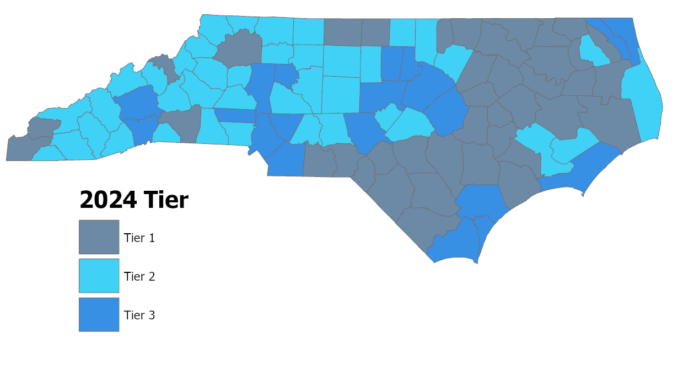
The North Carolina Rural Infrastructure Authority recently approved 31 grant requests to local governments totaling $10,982,835. The requests include commitments to create a total of 565 jobs, 135 of which were previously announced. The public investment in these projects will attract more than $211 million in public and private investment.
The authority has 17 members, with eight appointed by the governor, four appointed upon the recommendation of the president pro tempore of the Senate, four upon the recommendation of the speaker of the House and the secretary of Commerce. Members of the authority, except the secretary of Commerce, must come from the 80 N.C. counties ranked by the Department of Commerce as the most economically distressed. Grants support a variety of activities, including infrastructure development, building renovation, expansion and demolition, and site improvements.
The RIA approved nine grant requests under the state’s Building Reuse Program, with five projects focused on vacant buildings and four projects assisting existing businesses. The largest grant in this category ($500,000) went to Rockingham County to support the reuse of a vacant 451,624-square-foot building in Reidsville. The building will be occupied by Drylock Technologies, a manufacturer of hygiene products for baby, feminine and adult care. Drylock will create 113 jobs in the project, with 50 jobs and an investment of more than $2.35 million tied to this grant. Another $500,000 grant will support a 41,000-square-foot expansion of IFAB Corporation’s facility in Gastonia. Other cities and counties receiving grants were Forsyth County ($250,000), City of Hickory (Catawba County, $240,000), City of Rocky Mount (Nash County, $450,000), Pasquotank County ($200,000), City of Fayetteville (Cumberland County, $120,000), Gaston County ($250,000) and Pitt County ($100,000).
The RIA also approved four grant requests under the state’s Industrial Development Fund — Utility Account program. Columbus County will received a nearly $1.6 million grant to support expansion of the roadway leading into the International Logistics Park. The site is the first At-Port Distribution Park in North Carolina and will create an investment of $74 million. Other cities and counties receiving utility account program grants were Town of Wadesboro (Anson County, $223,075), City of Greensboro (Guilford County, $372,000) and Halifax County ($125,185).
The RIA approved 18 grant requests under the state’s new Rural Downtown Economic Development program. The program includes public infrastructure, public buildings and mixed use downtown developments. In the public infrastructure category, Burke, Caldwell, Catawba, Cherokee, McDowell, Moore, Pasquotank and Surry counties received grants that ranged from $250,000 to $850,000.
In the public buildings category, grants were awarded in Alamance, Burke, Robeson, Rowan, Scotland and Stokes counties and ranged from $62,500 to $487,500. Alexander ($412,500), Jones ($87,500) and Sampson ($212,500) counties received grants for mixed use downtown development.




